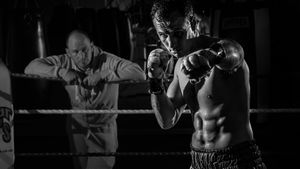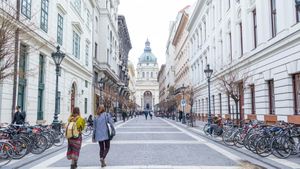The political debate show Schlagabtausch on ZDF has incited discussion and criticism over its audience's perceived bias, particularly favoring the leftist views advocated by participants from smaller parties like the Greens and the Left. During the February 6, 2025 airing, when the six-party debate took place, applause broke out for both Felix Banaszak, the leader of the Greens, and Jan van Aken, the head of the Left, signaling the audience's support for their political stances.
Conversely, attendees remained silent for representatives from the Free Democratic Party (FDP), the Alternative for Germany (AfD), and other conservative factions, including Christian Lindner (FDP), Sahra Wagenknecht (BSW), and Tino Chrupalla (AfD), which raised eyebrows among viewers. Many criticized this imbalance, claiming it created a sense of unfairness. Following the show, frustrations voiced on social media highlighted sentiments like, "Is there even representation for other opinions here?" and "It’s embarrassing to see such overt bias.” With the debate heating up, viewers lamented, “The audience seems like fan club members for the Left!”
One central theme of the evening’s discussion was the increasingly divisive subject of migration, brought to the forefront by the Five-Point Plan proposed by CDU/CSU leader Friedrich Merz. This issue has had far-reaching impacts on the election campaign, with numerous figures addressing the need for consensus on migration policy. Lindner urged for a "party-wide alliance" to combat the AfD's influence, stressing, "Die AfD wird man nicht kleinmachen mit Lichterketten. Die AfD macht man nur klein, indem man die Probleme klein macht, die diese Partei einst groß gemacht haben", which translates to, "The AfD will not be diminished by candlelight vigils. The AfD can only be diminished by addressing the problems they have amplified."
While Lindner's appeal highlighted unity against the AfD, Banaszak did not directly engage with his suggestion; instead, he reiterated, "Die AfD macht man vor allem nicht klein, indem man die Geschichten und die Narrative übernimmt, die diese Partei seit Jahren durchs Land treibt" or, "The AfD can primarily not be diminished by adopting the narratives they have long spread across the country." This response indicated the broader strategy of the Greens and other progressive parties to not replicate the rhetoric of the far-right but to approach migration issues from alternative angles focusing on inclusivity.
The criticism of ZDF’s audience dynamic did not go unnoticed, as numerous individuals remarked on the imbalance they perceived. One viewer commented, "The setup is disgraceful! It’s painfully biased and unjust. Is the audience actually just cheering for the Left's fan club?" Others voiced skepticism about the adequacy of representation for conservative opinions, describing the atmosphere as "different from what should be expected from public service broadcasting". One critique highlighted, "This is not right. Every side should be heard, and this was clearly not the case."
The migration question itself proved to be the hot button of the night, as the parties reiterated their stances on the issue. Lindner, echoing sentiments shared by many FDP representatives, emphasized the dire need for effective policies to juggle the demands of immigration, economic stability, and social cohesion. He criticized the inability to deal adequately with migration issues, lending support to his argument for inter-party collaboration to remedy pressing concerns and regain some stability to the political conversation surrounding it.
On the other side, participants like Jan van Aken illustrated the flipside of this issue, attributing the strain on municipalities to years of financial neglect. He pressed the notion, "Diese Überforderung beruhe vor allem darauf, dass die Städte und Kommunen in den vergangenen Jahren 'kaputtgespart' wurden", which reveals, "This overload is primarily due to the systematic underfunding of our cities and municipalities over the years.” This constructive view diverged from the narrative promoted by the right-wing parties which often stress increased border control and stringent policies.
Throughout the debate, various forces came to play as the representation of voters was intertwined with the political maneuvers currently dictinating the electoral ambiance. The show offered analysis and audience questions, facilitating direct interaction which aimed to balance the information flow amid apparent biases skewed against conservative audiences.
The dialogue of the evening, rich with claims and counterclaims, not only emphasized the ideological divides but also revealed the nuances of the contemporary German political climate. While the attempts to address pressing national issues suggest efforts to bridge these divides, the contentious atmosphere remained evident through the comments and reactions emanated from the viewers, many of whom called for fair representation across the political spectrum.
With the election looming, and pressing social issues left unresolved, Schlagabtausch remains illustrative of the broader concerns challenging representatives and constituents alike. How parties navigate the prevalent discourse on migration and economic equity will undoubtedly shape their platforms and influence voters as they head to the polls.



